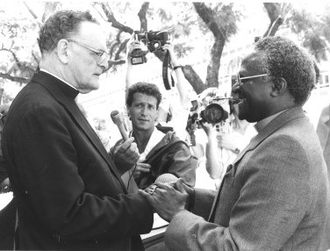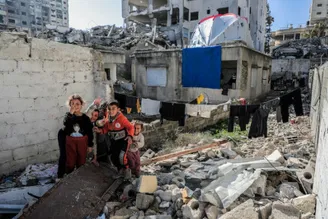Ian Linden: South Africa's heroes: new times, selective memories

Archbishop Denis Hurley with Archbishop Desmond Tutu Image: Denis Hurley Centre
The death of Archbishop Desmond Tutu over Christmas felt like the end of an era, the story of the anti-apartheid movement fading into the past. Journalists' 'first drafts of history' are giving way to second drafts with their selective memories and erasures.
The global anti-apartheid movement was much broader than the well-respected and effective Anti-Apartheid Movement that older readers in Britain will remember. Compared with other nationalist and liberation movements of the time an extraordinary combination of protagonists actively resisted the apartheid regime. Liberals as well as socialists and communists, the stoic resistance of Nelson Mandela and his colleagues on Robben Island, the schoolchildren of the 1976 Soweto uprising, the scores of organisations in the popular front of the 1980s, the United Democratic Front (UDF), minority religious communities as well as Christians and Church leaders, a broad coalition of ethnicities. Within and without South Africa, from civil disobedience to sports and consumer boycotts from campaigns for economic sanctions to mobilising ANC front-organisations from diplomacy to strategic planning by an exile ANC leadership as well as guerrilla infiltration, there was a huge variety of active resistance. A broad, heterogeneous movement fighting apartheid operated in the midst of the Cold War.
There were special and profound theological reasons for Protestant Christian resistance to 'the system'. One reason was similar to that of the Confessing Church's Declaration of Barmen in Nazi Germany. They confronted not only a national security state that tortured and murdered its opponents - as in Latin America - but the heresy of a form of Christian Nationalism, the ideological justification for apartheid promoted by the Nederduiste Gereformeerde Kerk (NGK), the Dutch Reformed Church.
There have been many touching encomia for Archbishop Tutu. He became the recognisable voice and Anglican face of non-violent opposition to apartheid violence. He also made work for human rights a key part of the life of the South African Council of Churches which he led from 1978 to 1984. In the repression of the mid-1980s when the internal leadership of the ANC were almost all jailed, a man of God spoke truth to power. In New York in 1986 following a failed UK visit to change Margaret Thatcher's mind on sanctions, Tutu publically challenged Reagan's refusal to exert economic pressures on the apartheid regime. Despite Presidential vetoes, Congress later that year passed an Anti-Apartheid Act including some economic sanctions.
If and when they sought a Christian leader offering newsworthy, clear and courageous comment and advocacy for many journalists Desmond Tutu was the only name in their address book. And perhaps for that reason the role of the Catholic Church in resisting apartheid often gets forgotten. I tried to remedy this in a chapter of my book on Global Catholicism which contains some of my memories from the 1980s: of Father Smangaliso Mkhatshwa, Secretary-General of the Southern African Catholic Bishops' Conference (SACBC) and ardent ANC supporter, arrested and tortured, of the inspiring Dominican theologian Father Albert Nolan and his spiritual guidance for young ANC supporters, along with the women of the Grail providing shelter for the many on the run. And, of course, Archbishop Denis Hurley of Durban.
Appointed in 1947 the youngest Catholic bishop in the world, after 1948 he was confronted with the injustice and inhumanity of Nationalist Party rule, and began gradually to campaign for change, calling for less talking about the principles of Catholic social teaching and more concrete action for justice. As President of the SACBC from 1952-1961, and again 1981-1987, he was able to take his convictions to a national level. Under his leadership the Conference denounced apartheid as "intrinsically evil" and successfully blocked draft legislation banning racially mixed worship. Later he was instrumental in setting up its Department of Justice and Peace.
But while he led and spoke out against the segregation of the Group Areas Act and the suffering of forced removals - "an enormous act of piracy" - getting others to follow and adopt a coordinated and strategic opposition to apartheid was less easy. Only in 1989 with the national Pastoral Plan did his vision see the full light of day. He could not count on the active support of all his archdiocesan clergy, let alone Rome, which tellingly never offered him a Cardinal's hat, while secular honours such as the Legion d'Honneur and the Chancellorship of Natal University came aplenty. It must have been a lonely position - perhaps made worse by a long clerical training in which intimacy and expressions of emotion were shunned, though he had many friends.
He did what he could from Durban, brought the Archdiocese into the local Council of the Churches, started Khanyisa, a catechetical centre, spun off Diakonia, an ecumenical social action centre, and PACSA, the Pietermaritzburg Agency for Christian Social Awareness. He supported IDASA , the Institute for Democracy in South Africa as a director. It became a major national institution. His support for the Young Christian Workers whose headquarters were in Durban was unswerving. He retired there in Sabon House, their offices converted into a retired priests' home. I remember the lovely scene as a black miner, with his helmet, analysed the worker struggle, argued with Cardinal McCann about Marxism, and told a meeting of the SACBC in 1982 what he expected of them. Archbishop Hurley was instrumental in persuading the bishops to support the launching of the radical New Nation newspaper, mouthpiece of the black democratic movement.
During the intense repression of the mid-1980s, Denis Hurley rose to the challenge, supporting the End Conscription Campaign, appearing in one instance in court to support Charles Yeats, a young Baptist conscientious objector, and saying in effect that the war in Namibia was an unjust war. He mounted a successful challenge to Section 29 of the Internal Security Act to get the Diakonia director, Paddy Kearney, out of detention, and was himself prosecuted in 1983 for "defaming" the brutal South African paramilitary koevoet units in Namibia by suggesting they committed atrocities. A year before a SACBC Report on Namibia had been categorical that they did. The case was dropped as the trial opened. He never fully came to terms with the campaign for sanctions against South Africa and feared its impact on South African workers.
He once told me how, for the benefit of the more intelligent security police listening, he would mention on the telephone that Cardinal Jozsef Mindszenty of Hungary had given him his ring. The message was that he would be more bothersome in jail than out. My most tender memory remains seeing Walter Sisulu, white-haired veteran of Robben Island and just out of jail, hugging and thanking him at Mama Sisulu's house in Soweto.
A friend of CIIR and CAFOD, Archbishop Hurley knew Britain and its ways well: Canon John Collins dragging him into St. Paul's sacristy - "the only safe place"- to hand over £20,000 from the International Defence and Aid Fund. My sneaking him through the back door of the old station hotel in Paddington for discussions with Oliver Tambo. Hugs then beer and sandwiches. All negotiated with a characteristic patience and wry amusement at the necessary subterfuge. Like Pope John XXIII, from out of a traditional priestly formation came a spirituality of great breadth and depth.
In triumphant scenes few will forget Nelson Mandela was released in February 1990. Then the Soviet Union imploded. Funding for the ANC was cut off almost overnight. Negotiations in the Convention for a Democratic South Africa began in 1991 and resulted in free and fair elections in 1994. It was sanctions that proved to be the proverbial last straw - more a heavy bale - which broke apartheid's back. A unique case of God and Mammon serving a common cause?
Professor Ian Linden is Visiting Professor at St Mary's University, Strawberry Hill, London. A past director of the Catholic Institute for International Relations, he was awarded a CMG for his work for human rights in 2000. He has also been an adviser on Europe and Justice and Peace issues to the Department of International Affairs of the Catholic Bishops Conference of England and Wales. Ian chairs a new charity for After-school schooling in Beirut for Syrian refugees and Lebanese kids in danger of dropping out partnering with CARITAS Lebanon and work on board of Las Casas Institute in Oxford with Richard Finn OP. His latest book was Global Catholicism published by Hurst in 2009.
Visit his website here: www.ianlinden.com
See also: Denis Hurley Centre - www.denishurleycentre.org/


















